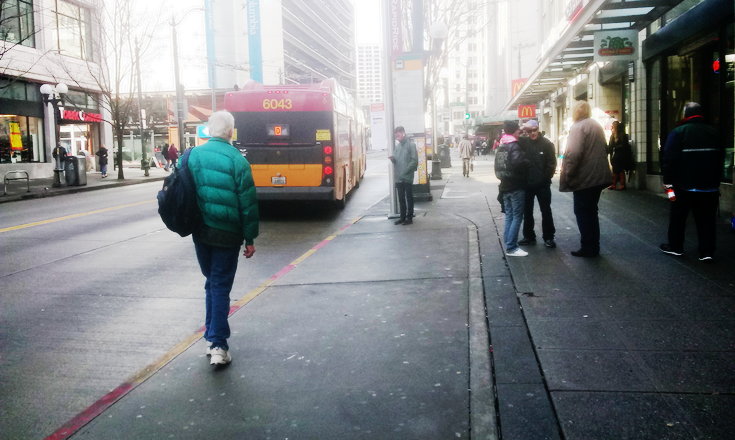As of March 2019, King County Metro will be changing how it enforces payment on buses, including Rapid Ride, especially those on Third Avenue. The changes to the fare violation program will no longer make failure to pay a fare citation misdemeanor, meaning violators won’t need to go to court or collections. It also reduces the fine for non-payment of transit fares from $124 to $50. There is a further reduction to $25 if the fine is paid within 30 days. If the fine is not paid, the individual will be suspended from Metro service for 30 days. Only violations of suspensions will result in misdemeanors.
The fine for non-payment of Metro transit fares reduced to $50. There is a further reduction to $25 if the fine is paid within 30 days.
As part of the new program, Metro is wiping out all previous citations and fines to give riders a fresh start. It will also provide the opportunity to repay penalties by completing community service hours instead of payment. If the fine is not paid, the same resulting suspension and potential misdemeanor will occur. King County Metro utilizes an outside company, Securitas, for fare enforcement and security.
On July 26th, 2018, King County Executive Dow Constantine proposed legislation for removing civil infractions for failure to pay. This move was supported by many advocacy groups. According to Katie Wilson, General Secretary for The Transit Riders Union; “Mobility is a human right. We appreciate Metro’s willingness to work with the community to move beyond a fare enforcement system that punishes low-income people, homeless people, and people of color.”

Metro was issuing 1.7 million dollars in fines a year, only $12,000 of which were paid.
This decision follows an April 2018 audit which found that the Metro was issuing 1.7 million dollars in fines a year, only $12,000 of which were paid. The review also found that officers issued more than 3,900 violations, of which only 94 citations were paid. Nearly 25% of citations and 30% of misdemeanor infractions issued are to people who are homeless or experiencing housing insecurity. Metro worked with advocacy groups to create a new program that worked with and for riders who couldn’t pay. Metro also launched investigations into why riders couldn’t pay.
“Metro’s goal should be to ensure that anyone can use public transportation to get to where they need to go. Punishing folks who can’t afford bus fare or who experience language barriers doesn’t fix the problem; it just exacerbates the conditions that marginalized communities are already struggling with,” said Rich Stolz, Executive Director of OneAmerica following the talks with metro.
A spokesperson for Sound Transit stated that […] failure to pay will continue to be a warning followed by a $130 fine and misdemeanor.
On March 23rd, all buses currently running through the downtown transit tunnel will be diverted to street level. This means the tunnel will be utilized exclusively by Link Light Rail, which is run by Sound Transit. A spokesperson for Sound Transit stated that they would not be adopting any new programs; failure to pay will continue to be a warning followed by a $130 fine and misdemeanor. When asked if Sound Transit planned any similar audits similar to those conducted by Metro, the same spokesperson said they would continue to conduct routine audits every few years. They also stated that the rate of unpaid infractions has always been significantly lower than King Country Metro. This may be in part because Sound Transit Security is a branch of the King County Sheriff’s Office.
Seattle Central Students have the option of buying an ORCA Lift card for $250 a quarter, and students who can prove they live below the poverty threshold can get a reduced fare pass for $125 a quarter. Passes can be purchased at the Cashier’s Office in BE1104 at the beginning of each quarter. However, for students who cannot afford that cost, getting to class can be extremely difficult. Students who do not take summer quarter are no longer able to obtain a discounted SCC pass, causing additional financial hardship. It will be important for riders to be aware of which of the three transit services operating in the greater Seattle area they are using.
This is a step in a new direction for Metro, allowing marginalized communities improved access to necessary transit options.
Author

Morgan is a Seattle Central alumni currently attending Oregon State University where she is majoring in Anthropology. In addition to writing, she enjoys painting and linguistics. She lives in a very small house with a very fat cat.







Be First to Comment